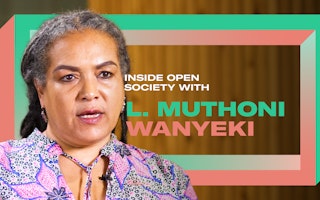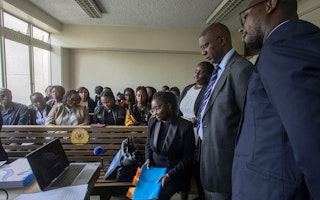How Internet and Mobile Help Journalists in the Democratic Republic of Congo
By Marie-Soleil Frère
Better and wider access to Internet and mobile is changing how journalists work in the Democratic Republic of Congo (DRC), bringing more access but also sometimes greater risk. Internet and mobile devices allow journalists to contact multiple sources on a single day, something that was difficult until now in a country where fixed phone lines are almost nonexistent. Internet and mobile also mean citizens are better able to contribute to media content and make their voices heard interactively.
But they also create new opportunities for intimidating or silencing journalists. There are many in positions of authority and power whose status is shaken by the greater circulation of information made possible by connectivity. At the same time, alerting others when a journalist is under threat and rallying support has never been quicker. More information also means increased requirements for verification and fact checking—procedures that Congolese journalists have not always been inclined and trained to do.
The annual report of Journalist in Danger (Journaliste en Danger), a Congolese nongovernmental organization, offers insight on how ICTs have changed journalists’ practices and challenges in the country. As well as describing many attacks on journalists over the previous year, the report shows how much mobile phones and the Internet have transformed the daily work of Congolese journalists. Journalists now are more connected to people, places, facts and opinions that were often closed off to them before this new technology became more widespread. The DRC remains one of the least connected countries in the world, but even the small foothold made by this technology is having a significant impact. This greater access also brings greater risk for the DRC’s journalists and most cases examined by Journaliste en Danger involve these new communication tools.
The astonishing impact of mobile phones was seen, for instance, in March 2012, during an open-mike radio program on Radio Television Kindu Maniema, in eastern DRC. The show hosted by Mira Dipenge and called “Voice to the People” (“Parole au Peuple”), allowed callers, many using mobile phones, a forum to discuss and often criticize life under the Governor of Maniema Province, Tutu Salumu. These open mike programs and talk shows have benefited hugely from the spread of mobile phones, making it possible for people in areas without fixed lines to join in the programs. The free and open exchange the progam allowed did not go unnoticed and now Dipenge, the program's host, has been forced into hiding after receiving threats.
Mobile phones have also facilitated access to information, allowing local journalists to reach sources they would never have been able to connect to a few years ago. On August 4 2012 Radio Soleil (Sun Radio), in Butembo, was suspended by the mayor after broadcasting a telephone interview with the spokesperson for the M23 rebels. The mayor claimed this interview violated the broadcasting regulator’s ban on radio stations in DRC from taking any calls about the war in Eastern Congo.
Mobile devices are not the only tools that are changing journalists’ daily work; social media plays a role as well and not always a positive one. On July 26 2012, a threatening message was posted on the Facebook wall of Tuver Wundi, a correspondent for National Congolese Radio and Television (RTNC), based in Goma. Also posted on the rebels’ website, the message accused Wundi of being “anti-M23” and warned him not to be around if and when they captured Goma. Journaliste en Danger evacuated Wundi to Kinshasa before the M23 took Goma in November 2012. After the rebels withdrew, he returned to Goma, where is now working normally.
Better Information and Communications Technology is providing a voice and a platform to once unheard DRC citizens. The audience becomes the news provider. In September 2012, a member of parliament (MP) directly threatened a television journalist, Roland Isso, who had broadcast mobile-phone video—sent in anonymously—that showed the MP openly calling his supporters to attack policemen who were guarding the property of a businessman with whom the MP had a dispute over property. (Isso works for Molière TV, which specializes in unedited video of eye-catching events around Kinshasa, caught by its roaming journalists or members of the public, and broadcast with little concern for privacy or professional ethics.) The MP subsequently denied any involvement in the death threats and announced that he would bring a libel action against Isso.
While they facilitate journalists’ access to information, these new tools also expose them to other dangers such as manipulation. “Journalists are now forced into doing the job of verifying, cross-checking and analyzing information,” explains Thsivis Tshivuadi, the secretary general of Journaliste en Danger. “Before, their job was mainly to provide information, but now that any citizen can access such a huge number of sources and even produce data, the role of the journalist is to discriminate between reliable and unreliable stories.”
These new tools also help to improve the journalists’ security, by speeding up the circulation of information when one of them is in trouble. Ten years ago, Journaliste en Danger had to transmit its alerts and reports about journalists’ rights abuses by fax, and the information could only be sent to a very limited number of targets because of the high cost of fax transmission.
Today, every attack on media freedom in the DRC is immediately relayed to thousands of subscribers who receive Journaliste en Danger alerts. Any journalist who is arrested or physically attacked makes his last phone call to Journaliste en Danger before their phone is confiscated. “This has changed our job too,” says Tshivuadi. “More and more we have to interact directly, by mobile phone, with the people who are detaining or threatening journalists. We can talk to the policemen or army men and try to convince them to release a colleague who was arrested while taking pictures or shooting video. We have become long-distance mediators.”
While the email alerts mainly go to foreign recipients, Journaliste en Danger has also developed a mobile service which is received by some 700 individuals inside the country, including diplomats, senior officials and major NGOs. On March 11 2013, when the Ministry of Post, Telecommunications and ICTs announced that nine broadcasters were suspended for not paying their annual broadcasting fees, Journaliste en Danger sounded the alarm. “The first SMS recipient to call me back was the Minister himself,” explains Tshivuadi. “He is on our distribution list and felt embarrassed, and he wanted to justify his decision.”
For Congolese journalists, Information and Communication Technologies have become a source of empowerment, helping them to open up and connect to the world, while they reshape their working practices. Organizations like Journaliste en Danger can provide support and protection for journalists as they navigate this new and challenging environment.
Marie-Soleil Frère is senior research associate at the National Fund for Scientific Research (Belgium) and director of the Research Center in Information and Communication (ReSIC) at the University of Brussels.


